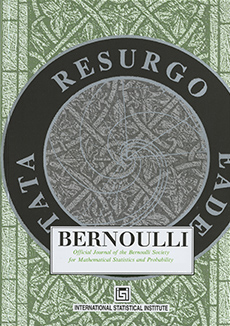Abstract
Let $\sigma,t\in\mathbb{R}$, $s=\sigma+\mathrm{{i}}t$, $\Gamma(s)$ be the Gamma function, $\zeta(s)$ be the Riemann zeta function and $\xi(s):=s(s-1)\pi^{-s/2}\Gamma(s/2)\zeta(s)$ be the complete Riemann zeta function. We show that $\Xi_{\sigma}(t):=\xi(\sigma-\mathrm{{i}}t)/\xi(\sigma)$ is a characteristic function for any $\sigma\in\mathbb{R}$ by giving the probability density function. Next we prove that the Riemann hypothesis is true if and only if each $\Xi_{\sigma}(t)$ is a pretended-infinitely divisible characteristic function, which is defined in this paper, for each $1/2<\sigma<1$. Moreover, we show that $\Xi_{\sigma}(t)$ is a pretended-infinitely divisible characteristic function when $\sigma=1$. Finally we prove that the characteristic function $\Xi_{\sigma}(t)$ is not infinitely divisible but quasi-infinitely divisible for any $\sigma>1$.
Citation
Takashi Nakamura. "A complete Riemann zeta distribution and the Riemann hypothesis." Bernoulli 21 (1) 604 - 617, February 2015. https://doi.org/10.3150/13-BEJ581
Information





